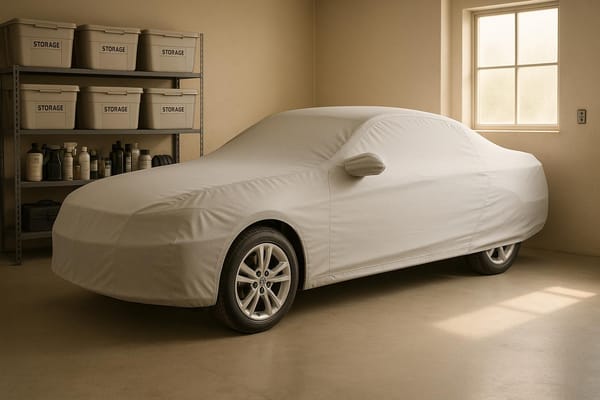Ultimate Guide to Exotic Car Storage and Transport
Learn essential tips for storing and transporting exotic cars, focusing on climate control, security, and maintenance to preserve their value.

Protecting your exotic car is simpler than you think. Whether you own a rare Ferrari or a limited-edition McLaren, proper storage and transport are crucial to maintaining its value and condition. Here’s what you need to know:
- Climate Control: Store your car in a stable environment with controlled temperature (mid-teens °C) and humidity to prevent damage to delicate materials like carbon fibre and electronics.
- Security: Choose facilities with 24/7 CCTV, biometric access, and fire suppression systems.
- Preparation: Clean your car, check fluids, maintain tyre pressure, and connect a trickle charger before storing it.
- Transport: Use enclosed transport with trained professionals to ensure safe handling and delivery.
- Insurance: Specialist policies protect against risks during storage and transit.
Storage Requirements for Exotic Cars
Temperature and Humidity Control
Keeping your exotic car in the right environment is crucial. Aim to store it in a climate-controlled space with a temperature in the mid-teens (°C) and balanced humidity levels. These settings help protect rubber seals and electrical components from damage.
Key factors to manage:
- Keep the temperature steady
- Use dehumidifiers to control moisture
- Ensure good air circulation
Security Systems
High-end storage facilities use advanced security measures to safeguard your car against theft or damage. These include:
- 24/7 CCTV monitoring
- Controlled access with biometric or electronic systems
- Perimeter security equipped with intrusion detection
- Advanced fire suppression systems
Storage Preparation Steps
-
Pre-storage Cleaning
- Wash and wax the car thoroughly
- Check specialised coatings and consider using a storage cover
-
Mechanical Preparation
- Change the oil and filters
- Fill the fuel tank and add a stabiliser
- Check all fluid levels
- Adjust tyre pressures to the manufacturer's recommendations
-
Battery Maintenance
- Connect a trickle charger with voltage monitoring
-
Climate Monitoring
- Use wireless sensors to track storage conditions
- Regularly inspect tyre pressure, battery health, and fluid levels
Premium Car Storage In The Cotswolds | The Classic Motor Hub

How to Select a Storage Facility
Choosing a storage facility for your exotic car requires careful consideration. The right facility can make a big difference in preserving your vehicle's condition. Here's an overview of the key features and services to look for.
Essential Facility Features
A high-quality storage facility should have the right infrastructure to protect luxury vehicles. Key features include:
- Climate Control
- Advanced HVAC systems with precise temperature regulation
- Dehumidifiers with automated monitoring to manage moisture levels
- Air filtration systems to minimise dust and airborne particles
- Reliable Power Systems
- Backup generators to maintain climate control during outages
- Battery charging stations
- Stable electrical systems for sensitive vehicle electronics
- Maintenance Tools
- Hydraulic lifts for inspections and repairs
- Diagnostic tools for system checks
- Dedicated detailing areas for professional cleaning
Additional Services
Top-tier facilities often go beyond basic storage, offering tailored services to meet the needs of exotic car owners:
- Transport Services
- Enclosed transport vehicles for safe collection and delivery
- Drivers experienced in handling high-value cars
- GPS tracking to monitor vehicle movements
- Routine Maintenance
- Battery monitoring to prevent drainage
- Regular tyre pressure checks
- Fluid inspections to ensure optimal performance
- Detailed Records
- Digital logs of all vehicle interactions
- Real-time updates on storage conditions
- Access to a secure client portal for updates and documentation
Look for facilities that provide full insurance coverage and maintain detailed logs of all vehicle handling. The best options will also share their security measures and maintenance schedules, giving you confidence that your car is in good hands.
Transport Methods and Safety
Transporting exotic cars requires specialised equipment and skilled handling to protect your vehicle during transit. The method of transport and the handling process play a key role in ensuring the car arrives in perfect condition.
Types of Transport Containers
Exotic cars are typically transported using two main types of containers:
-
Hard-Shell Containers
These containers offer a rigid, enclosed space that provides strong protection. Designed to create a secure and controlled environment, they shield the vehicle from external damage while ensuring it remains firmly in place. -
Soft-Shell Enclosed Transport
Using a weather-resistant cover, this option provides decent protection and allows for easier loading and unloading. It's a practical choice in suitable conditions and can sometimes be more cost-effective.
Choosing the right container is just one part of the process - proper handling is equally important.
Professional Handling Standards
Transporting high-value vehicles requires trained professionals who follow strict guidelines to ensure safety. Key practices include:
- Conducting a thorough pre-transport inspection and documenting the car’s condition
- Using proper loading procedures with secure tie-down systems and equipment
- Maintaining communication with the owner throughout transit
These steps help guarantee that your vehicle arrives at its destination in the same pristine condition it was in before transport.
UK Weather Storage Guidelines
The UK's unpredictable weather calls for specific measures when storing exotic cars. Proper environmental control is crucial to protect your vehicle from potential damage caused by temperature fluctuations and humidity.
Cold Weather Protection
When storing your car during winter, take these steps:
- Battery Care: Use a trickle charger designed for low temperatures to keep the battery in good condition.
- Condensation Prevention: Place dehumidifiers or moisture absorbers near the vehicle to minimise the risk of condensation.
- Tyre Maintenance: Slightly increase tyre pressure above normal levels and, if possible, use tyre supports to avoid flat spots.
Hot Weather Care
Even UK summers can pose risks for car storage. Follow these tips:
- Shield from UV Rays: Apply UV-filtering films to windows or use a protective cover to safeguard the interior and paint from sunlight.
- Ensure Proper Ventilation: Keep airflow steady and maintain an ambient temperature between 18°C and 21°C.
- Protect the Paint: Use a breathable car cover to avoid moisture build-up and prevent paint damage.
To maintain optimal conditions throughout the year, use digital thermometers with remote monitoring features and consider climate-controlled storage pods for consistent temperature and humidity levels.
Insurance and Record Keeping
Regular motor insurance isn't designed to handle the specific risks of storing or moving high-value exotic cars. To protect your investment, look for a dedicated policy that covers potential issues during storage and transit. Alongside this, maintaining detailed condition records of your vehicle provides a verified snapshot of its state, which can be crucial for any claims.
Exotic Car Insurance Coverage
Specialist insurance for exotic cars is tailored to address the risks tied to their storage and transportation. Carefully review your policy to confirm it covers all potential scenarios your vehicle might encounter, whether it's parked or on the move.
Summary
Storing and transporting exotic cars requires careful attention to detail. Maintaining a stable, climate-controlled environment, along with strong security measures, is key to protecting sensitive components and keeping the vehicle safe.
Professional transport services follow strict handling standards and use specialised equipment to protect vehicles during transit. Keeping detailed records, such as condition reports and maintenance logs, helps with insurance claims and preserves the car's history.
FAQs
What should I look for when selecting a storage facility for my exotic car?
When choosing a storage facility for your exotic car, it’s essential to prioritise security, climate control, and proper handling. Look for facilities with advanced security systems, such as 24/7 surveillance and restricted access, to ensure your car is safe.
Climate-controlled storage is crucial to protect your car from extreme temperatures and humidity, which can damage its paint, upholstery, and mechanical components. Additionally, check if the facility offers specialised handling and maintenance services to keep your vehicle in pristine condition.
Finally, consider the location and accessibility of the facility, as well as any additional perks such as insurance coverage or regular inspections. Taking these factors into account will help you find a storage solution that ensures your exotic car remains in top condition.
Why is climate control important for storing exotic cars?
Climate control is essential for preserving the delicate components of exotic cars. These vehicles often feature high-performance materials, such as fine leather interiors, carbon fibre elements, and advanced electronics, which can be sensitive to temperature fluctuations and humidity.
A climate-controlled storage facility maintains stable conditions, typically around 18–21°C, and regulates humidity to prevent issues like rust, mould, or cracking. By ensuring a consistent environment, you can help protect your car’s value and keep it in pristine condition.
Why is specialist insurance important for exotic cars during storage and transport?
Specialist insurance is vital for exotic cars during storage and transport as it offers tailored protection that standard policies may not provide. These bespoke policies often cover unique risks such as accidental damage during transit, theft, or environmental factors that could harm high-value vehicles.
Additionally, specialist insurance can provide peace of mind by ensuring your car is protected against unforeseen events, whether it's being stored in a climate-controlled facility or transported across the country. This level of coverage is particularly important for rare or investment-grade vehicles, where repair costs or replacement may be significantly higher than average.




